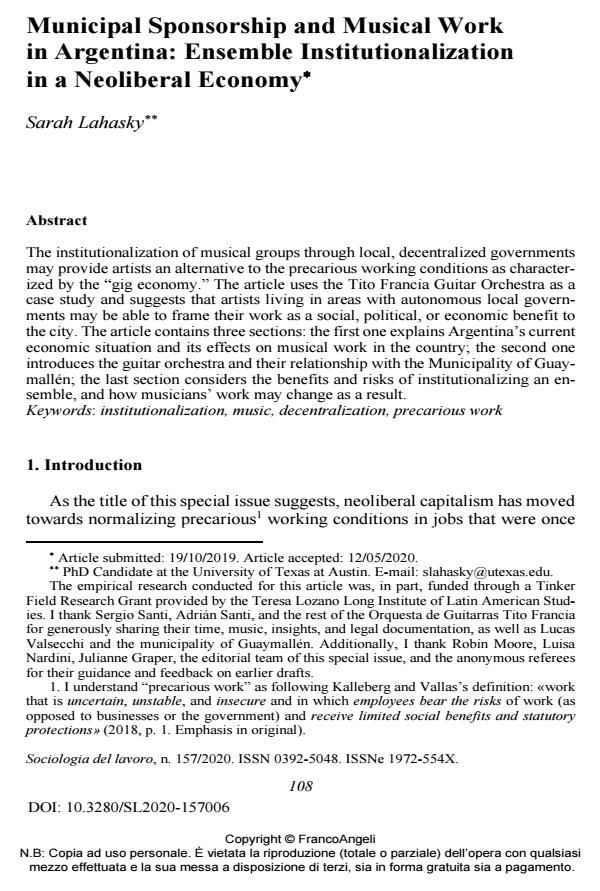Municipal Sponsorship and Musical Work in Argentina: Ensemble Institutionalization in a Neoliberal Economy
Titolo Rivista SOCIOLOGIA DEL LAVORO
Autori/Curatori Sarah Lahasky
Anno di pubblicazione 2020 Fascicolo 2020/157
Lingua Inglese Numero pagine 17 P. 108-124 Dimensione file 234 KB
DOI 10.3280/SL2020-157006
Il DOI è il codice a barre della proprietà intellettuale: per saperne di più
clicca qui
Qui sotto puoi vedere in anteprima la prima pagina di questo articolo.
Se questo articolo ti interessa, lo puoi acquistare (e scaricare in formato pdf) seguendo le facili indicazioni per acquistare il download credit. Acquista Download Credits per scaricare questo Articolo in formato PDF

FrancoAngeli è membro della Publishers International Linking Association, Inc (PILA), associazione indipendente e non profit per facilitare (attraverso i servizi tecnologici implementati da CrossRef.org) l’accesso degli studiosi ai contenuti digitali nelle pubblicazioni professionali e scientifiche.
The institutionalization of musical groups through local, decentralized govern-ments may provide artists an alternative to the precarious working conditions as characterized by the gig economy. The article uses the Tito Francia Guitar Or-chestra as a case study and suggests that artists living in areas with autonomous local governments may be able to frame their work as a social, political, or eco-nomic benefit to the city. The article contains three sections: the first one explains Argentina’s current economic situation and its effects on musical work in the country; the second one introduces the guitar orchestra and their relationship with the Municipality of Guaymallén; the last section considers the benefits and risks of institutionalizing an ensemble, and how musicians’ work may change as a result.
L'istituzionalizzazione dei gruppi musicali attraverso i governi locali e decentralizzati può fornire agli artisti un'alternativa alle precarie condizioni di lavoro che caratterizzano la "gig economy". L’articolo considera come caso di studio l'Orquesta de Guitarras Tito Francia di Mendoza, in Argentina e suggerisce che gli artisti che vivono in aree con governi locali autonomi possono essere in grado di definire il proprio lavoro nei termini di un beneficio sociale, politico ed economico per la municipalità. L'articolo è strutturato in tre sezioni: la prima riferisce dell'attuale situazione economica in Argentina e dei suoi effetti sul lavoro musicale; la seconda introduce l'ensemble studiato e il suo rapporto con il comune di Guaymallén; l’ultima sezione considera vantaggi e rischi dell'istituzionalizzazione di un ensemble e come questa possa modificare il lavoro dei musicisti.
Parole chiave:Istituzionalizzazione, musica, decentralizzazione, lavoro precario
Sarah Lahasky, Municipal Sponsorship and Musical Work in Argentina: Ensemble Institutionalization in a Neoliberal Economy in "SOCIOLOGIA DEL LAVORO " 157/2020, pp 108-124, DOI: 10.3280/SL2020-157006